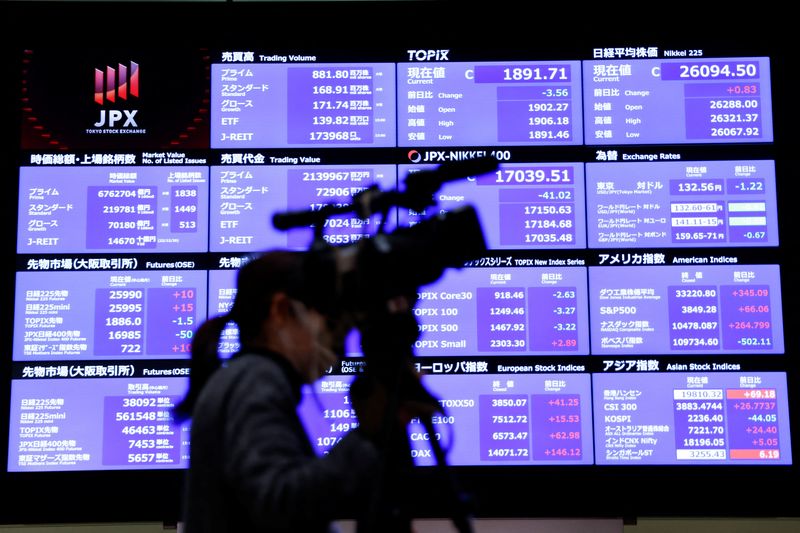By Nell Mackenzie
LONDON (Reuters) - World shares firmed on Monday as investors braced for a busy run of inflation data that could set the scene for a European rate cut as soon as next week and a U.S. policy easing within just a few months.
Holidays in Britain and the United States made for thin trading ahead of Friday's figures on core personal consumption expenditures (PCE), the Federal Reserve's preferred measure of inflation.
MSCI's broadest index of stocks gained 0.2%, having slipped 0.38% last week and just shy of an all-time peak of over 796.
"The pathway to the Federal Reserve's 2% target appears longer and more arduous than anticipated last year," Bruno Schneller, managing director at Erlen Capital Management, said.
Median forecasts expect this week will see a rise of 0.3% in the PCE price index in April according to a Reuters poll, keeping the annual pace at 2.8%, with risks on the downside.
U.S. economic recovery remains uneven, with sectors such as manufacturing showing signs of slowdown, while services remain resilient, Schneller told Reuters.
"This complex scenario likely delays any potential rate cuts to late 2024 or beyond, requiring continuous monitoring of incoming data to gauge the appropriate timing and pace of monetary policy adjustments," he added.
Figures for inflation in the euro zone are also due on Friday and economists believe an expected tick up to 2.5% should not stop the European Central Bank from easing policy next week.
Policymakers Piero Cipollone and Fabio Panetta both flagged a coming cut over the weekend, while markets imply an 88% chance of an easing to 3.75% on June 6.
By Thursday, the ECB will enter a quiet period before its June 6 meeting, analysts at Societe Generale (OTC:SCGLY) noted.
"Questions have been raised on how the latest wage data gel with the view that wage growth is easing, and we may hear more ECB speakers stressing that the 1Q data have been affected by temporary factors," their note said.
The Bank of Canada might also ease next week, while the Fed is seen waiting until September for its first move.
At least eight Fed officials are due to speak this week, including two appearances by the influential head of the New York Fed, John Williams.
The head of the Bank of Japan (BOJ) said on Monday it would proceed cautiously with inflation-targeting frameworks, adding that some challenges were "uniquely difficult" for Japan after years of ultra-easy monetary policy.
The BOJ holds its policy meeting on June 14 and there is some chance it may buck the global trend and hike rates again, albeit to a modest 0.15%.
WAITING GAME
European stocks were subdued on Monday, with several major markets closed and investors taking a cautious stance ahead of this week's inflation data.
The pan-European STOXX 600 index was up 0.2% at 1228 GMT. With the U.S. and UK markets closed on Monday, trading activity was light across the board.
S&P 500 and Nasdaq futures remained steady, as the market would next open on Tuesday. The Nasdaq hit record highs last week after Nvidia (NASDAQ:NVDA) beat expectations.
In currency markets, attention was again centred on the yen and the risk of Japanese intervention ahead of the 160.00 level. The dollar stood at 156.84 yen, having added 0.9% last week and close to its recent top of 160.245.
Japan renewed its push to counter excessive yen falls during a weekend gathering of Group of Seven (G7) finance leaders, after a recent rise in bond yields to a 12-year high failed to slow the currency's decline.
The euro steadied at $1.0850, and short of its recent top at $1.0895.
Gold rose about 0.6% to $2,348 an ounce, having recoiled 3.4% last week and off an al-time peak of $2,449.89. [GOL/]

Oil prices were stuck near four-month lows amid concerns about demand, as the U.S. driving season gets underway this week. Investors are waiting to see if OPEC+ will debate new output cuts at an online meeting on June 2, though analysts doubt there will be a consensus for a move. [O/R]
Brent was up 55 cents at $82.67 a barrel, while U.S. crude rose 55 cents to $778.27 per barrel.